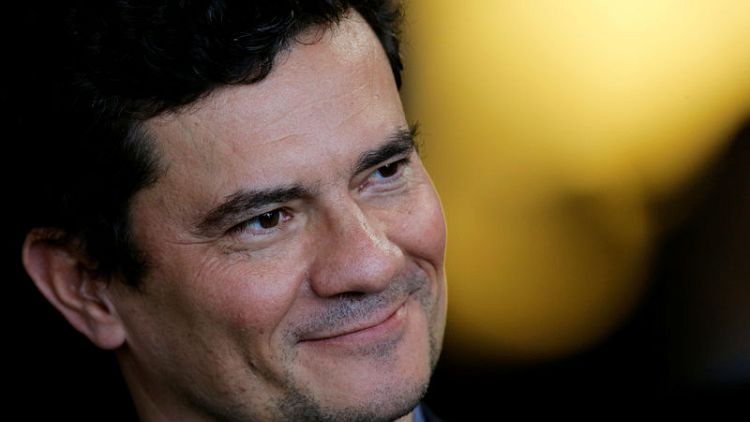By Anthony Boadle
BRASILIA (Reuters) - Brazil's Justice Minister Sergio Moro said he would not resign over a scandal about leaked personal messages that raised doubts about his impartiality as the anti-corruption judge who jailed the country's former leftist president.
In an interview published on Friday, Moro told the Estado de S.Paulo newspaper that he was not worried that the corruption conviction against former president Luiz Inacio Lula da Silva would be overturned, which legal experts including the Brazilian Bar Association and some Supreme Court Justices say could happen.
It was Moro's first interview since some of the messages from a hacked social media app were made public.
The Intercept news website earlier this week published stories based on what it said was an "enormous trove" of leaked messages exchanged between federal prosecutors, Moro and others involved in the investigation and prosecution of Brazil's "Car Wash" corruption probe.
Moro said he was not concerned by contents of the leaked messages and challenged the Intercept to make it all public.
"If they want to publish everything, then publish everything. I have no problem with that," he said.
Considered the world's largest graft investigation, it has uncovered billions of dollars paid in bribes in schemes mostly involving sweetheart contracts at state-run firms. It has brought down hundreds of members of the business and political elite of Brazil and across Latin America.
The leaked messages include exchanges Moro had with prosecutors, in which he advised on the focus, pace and sequence of investigations.
Moro told the newspaper he did not think there was anything illegal in his chats with prosecutors. Notable legal figures, including members of Brazil's Supreme Court, have publicly disagreed with that assessment.
"There was no collusion," Moro said. "I am absolutely at ease with the nature of my messages."
Moro said Lula's case "was decided with absolute impartiality based on proof without any type of influence."
But Lula's lawyers have long argued that Moro was a politically motivated, biased judge who wanted to jail Lula to block him from running for the presidency last year, when opinion polls showed him easily leading the race, even after he had been jailed.
Many have called for Moro's resignation, including the Estado de S.Paulo itself, which published an editorial earlier this week saying he should step down.
The Intercept said it was only beginning to report on the leak it received from an anonymous source.
The Moro messages have added momentum to efforts to overturn Lula's conviction by supporters of the leftist ex-president, who is still the most influential opposition figure in Brazil.
The Supreme Court will debate an appeal for his release on June 26, though Lula is facing at least six other trials on corruption charges.
Moro was picked for justice minister by right-wing President Jair Bolsonaro, who won the presidency after Lula was barred from running because of his conviction. Moro said he does not expect an anti-crime package of laws he sent to Congress will be derailed by the questions about his impartiality in the Car Wash case.
Bolsonaro told reporters on Friday that there was "no chance, zero" of Moro being pushed out of his minister role.
(Reporting and writing by Anthony Boadle; Additional reporting by Ricardo Brito in Brasilia; editing by Bill Berkrot)


